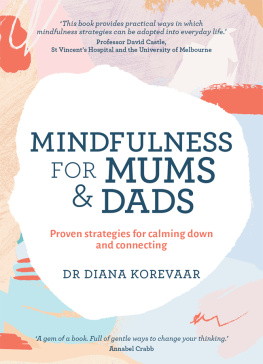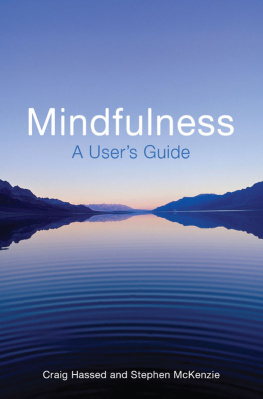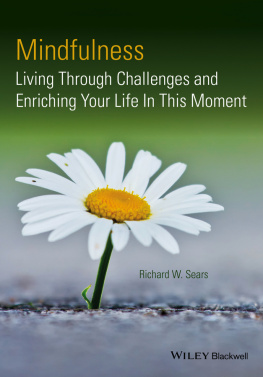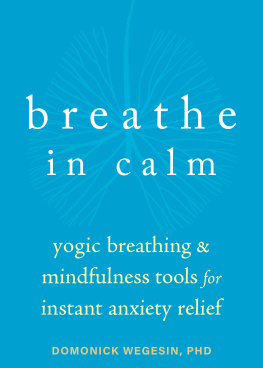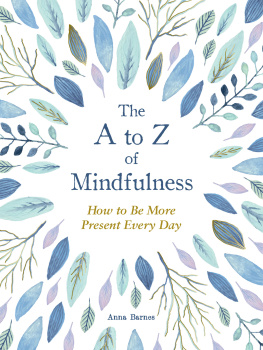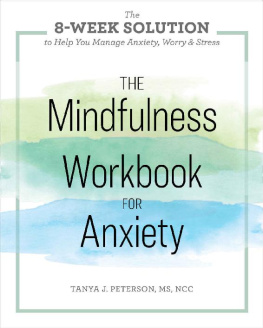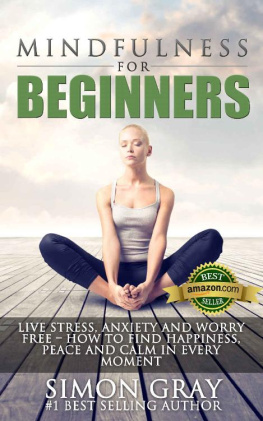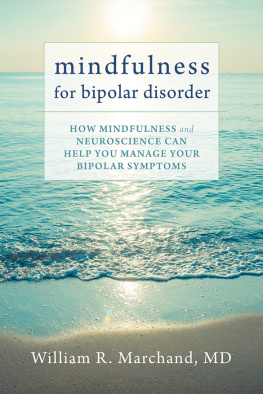This book adds to the growing literature on mindfulness but fills a significant gap by targeting specifically new mothers and fathers. It explains the mindfulness concepts then provides practical ways in which mindfulness strategies can be adopted in everyday life. There are helpful illustrative case vignettes which help the reader understand the practical applications of the techniques.
David Castle, chair of psychiatry at St Vincents Hospital and professor at the University of Melbourne
In this book, Dr Diana Korevaar draws deeply on clinical and personal experience and knowledge of literature across themes of mindfulness and compassion. She brings these together in an accessible and elegantly produced volume addressing how these ways of being can be cultivated in ways that may be helpful for the particular challenges of being a parent. Id recommend it for mums and dads who are keen to explore what these ancient wisdoms, as now being reinterpreted in light of 21st century research, might have to offer them.
Graham Meadows, professor of psychiatry, Monash University
Mindfulness for Mums and Dads is the perfect blend of science and application. Dr Diana Korevaar has written a book that simplifies the science and makes it easy for almost any parent to create basic mindfulness practices in their family that will enhance wellbeing. This book will make you, your children your whole family happier. Highly recommended.
Dr Justin Coulson, parenting and positive psychology speaker and author
This book will make you, your children your whole family happier. Highly recommended.
Dr Justin Coulson,
parenting and positive psychology speaker and author
As a parent, it can be all too easy to live life on automatic pilot fulfilling one demand after another while missing out on much of the journey. And though you cant control every situation, you can influence the outcome by learning to change how you react.
Dr Diana Korevaar, a practising perinatal psychiatrist, uses mindfulness practice as a powerful tool to help parents calm down, connect and reframe the challenges they face in order to experience life more positively.
Grounded in science, Mindfulness for Mums and Dads features dozens of case studies, as well as simple mindfulness practices that can be carried out anywhere. These are practical tools for anyone seeking to actively engage in their own recovery from anxiety or depression, or for those no longer content to just exist in life, hoping that things will get better in the future.
In as little as three minutes a day, it is possible to take control of your life, become calmer and more compassionate, and be fully present for the small moments in life that create true and lasting happiness.
DR DIANA KOREVAAR is a consultant psychiatrist specialising in womens health, pregnancy and perinatal psychiatric disorders. She has had extensive training in mindfulness-based treatment approaches, and has employed these techniques not only in her work, but also in her personal life. In the course of her work, Diana has observed how men and women from all walks of life have benefited from this approach. She co-wrote the Mind the Bump mindfulness and meditation app developed by Beyond Blue and Smiling Mind in 2014. Diana continues her work in this field from her practice in Melbourne, Australia.
drdianakorevaar.com.au
Beautifully written and illustrated, Dr Korevaar admirably succeeds in translating latest neuroscientific understandings into everyday language and simple practical exercises. I can wholeheartedly recommend this fabulous book not just for mums and dads, but for aunts, uncles, grandparents, cousins, and children!
James Bennett-Levy, professor of mental health and psychological wellbeing, University of Sydney
This is a little gem of a book. Quiet, helpful and well written. Full of gentle ways to change your thinking, in a way that actually sounds feasible to a parental brain at warp point. The kind way Dr Korevaar writes makes me want to drop round to her place for a cup of tea and a sob. But the books a close second; warm, helpful and readable.
Annabel Crabb
To my husband, our precious children and our family
this book is dedicated to you all.
Contents
Introduction
T he world that we are living in and our children are growing up in is incredibly complex. It moves very quickly and the experience is often challenging. It is all too easy as a parent to get into an automatic pilot mode of living, simply pursuing one goal after another; in the process missing out on so much of the journey. In this book I hope to inspire you to step aside from the busy flow of life, and take advantage of the exciting developments in the field of neuroscience and mindfulness, by finding ways of applying the techniques to your own personal experience of life.
For most parents, attaining a sense of contentment and being at ease can all too often seem frustratingly elusive. What starts with the excitement (or pressure) of wanting to achieve a pregnancy, is often quickly replaced with worrythat check-ups will confirm things are normal and that the child will be well. If, at the end of the pregnancy, we are presented with a healthy baby it can then feel as if a whole new world of things to worry about pours into our life. Why is this baby not sleeping? Is she getting enough milk? Why wont she stop crying? Am I doing the right things? And on it goes.
The trap we can easily fall into is coming to rely too heavily upon what is or isnt happening in order to feel okay. The experiences we get excited abouta new partner, a pregnancy or a holiday, at best provide only a temporary settling of this inner yearning for happiness.
Poet Rainer Maria Rilke writes of life:
Be patient toward all that is unsolved in your heart and try to love the questions themselves, like locked rooms and like books that are now written in a very foreign tongue. Do not now seek the answers, which cannot be given you because you would not be able to live them. And the point is, to live everything. Live the questions now. Perhaps you will then gradually, without noticing it, live along some distant day into the answer.
If we dare to accept that these painful feelings of frustration, boredom or worry are not an indication that something is wrong, but are in fact integral to the experience of life and being a parent, then where does that actually leave us?
From my perspective as a perinatal psychiatrist, it leaves us in a more optimistic and exciting position than that of previous generations. Since the teaching of mindfulness was introduced to Western society over three decades ago, it has developed into a rich and diverse practice that lends itself perfectly to the task of enriching our relationships. Not only that, but when the techniques of mindfulness are incorporated in the way we parent our children, research suggests it is more likely they will develop greater emotional resilience, a quality that is more strongly associated with happiness in life than income or career.

